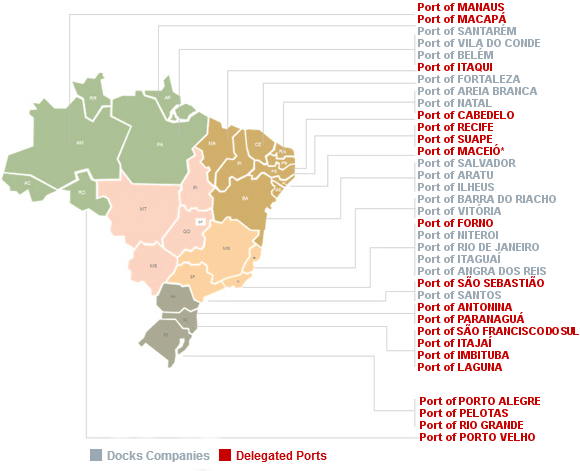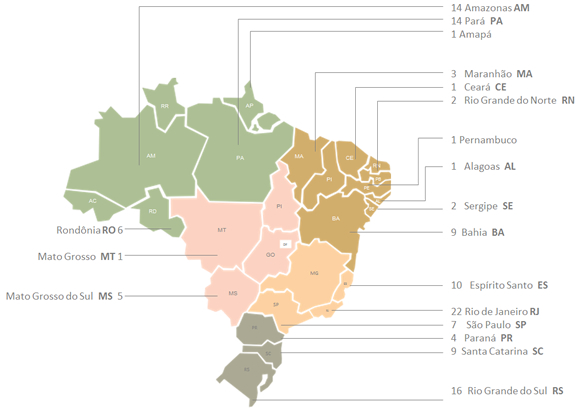The National Port System
With a navigable coast of 8.5 thousand kilometers, Brazil has a port system that handles approximately 700 million ton commodities per year and it is responsible itself for over 90% of exports.
The Presidency Secretariat for Ports is responsible for formulating the policies and promoting the execution of measures, programs and projects to support the infrastructure development of maritime ports. It is also SEP/PR’s responsibility to participate in strategic planning and the concession plan approval. Those plans seek to ensure the safety and efficiency of the maritime transportation of cargo and passengers.
Among the 35 statutory ports administrated by SEP/PR, 14 of them are delegated, awarded or authorized to be operated by the state and city governments. The other 23 maritime ports are administrated by the dock companies, which are shared private and public companies that have the Federal Government as the major stockholder, and therefore are directly linked to the Presidency Secretariat for Ports.
The waterway and lake navigation are under the responsibility of the Ministry of Transports.
Statutory ports

Altogheter, there are seven dock companies that are responsible for the ports as displayed below:
Dock Company of Ceará – CDC*
- Port of Fortaleza.
Dock Company of Pará – CDP*
- Belém, Santarém and Vila do Conde Ports.
Dock Company of Rio Grande do Norte – Codern*
- Natal and Maceió ports as well as Areia Branca Salt Terminal.
Dock Company of Bahia State – Codeba*
-Salvador, Ilhéus and Aratu ports.
Dock Company of Espírito Santo – Codesa*
- Vitória and Barra do Riacho ports.
Dock Company of Rio de Janeiro – CDRJ*
-Niterói, Rio de Janeiro, Angra dos Reis and Itaguaí ports.
Dock Company of São Paulo State – Codesp*
- Port of Santos.
* In portuguese
Private Use Terminals (TUPs)
Private terminals accounted for 65% of Brazil's cargo handling in 2012. The port system (public ports and TUPs) as a whole allowed for the movement of 904 million tons (solid bulk, liquid bulk and general cargo) in 2012, up from 886 million tons in 2011 - an increase of 2.07%.
Currently, there are 128 Private Use Terminals (TUPs) and six Cargo Transshipment Stations (ETCs) authorized to operate in Brazil. Until June this year, the existing permits for operation will be adapted by ANTAQ and a new contract will be signed between the interested party and the SEP. The new private terminals must operate outside the area defined for the organized (public) port.


